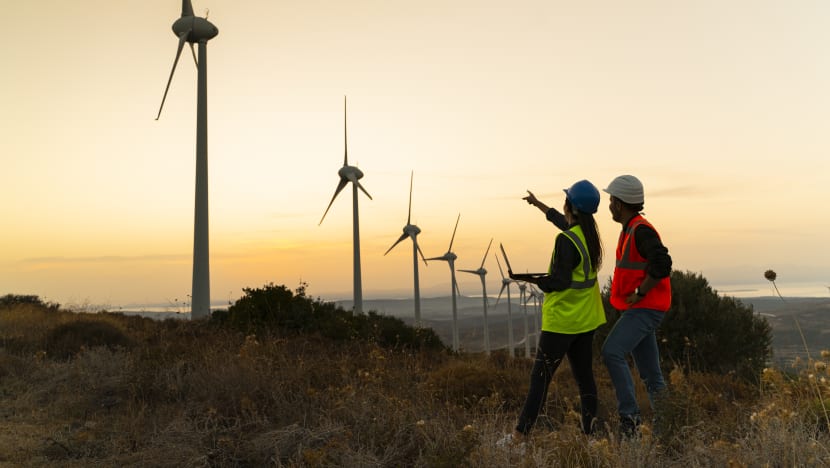Green is the new gold: Focus on sustainability drives demand for ESG talent
Interest is growing in sustainability, but the sector still has a shortage of expertise. Money Mind looks at some ways to get more of such talent in the pipeline.

Silhouette of young engineer holding laptop computer planning and working for the energy industry and standing beside a wind turbines farm power station at sunset time. (Photo: iStock)
SINGAPORE: Green entrepreneur Robin Pho is a man familiar with life pivots. Since graduating from university in 2004, he has had careers in three different fields.
“I first started my career in banking working for ABN AMRO and UBS, and I will say back then it was more about financial performance. Then when I left banking and went to the family business, it was a lot more about manpower supply for the oil and gas industry.”
Today, Mr Pho is the founder and CEO of Right People Renewable Energy, which helps customers make the switch from fossil fuels to clean energy.
The company specialises in helping communities in off-grid locations, often with challenging logistics and infrastructure.
The enterprise is driven by what he calls the triple bottom line of people, planet, and profit.
This aim of making a positive impact while running a viable business is one of the fastest growing investment themes, as the world grapples with climate change and its challenges.
In 2020, investors put more than US$51 billion into sustainable US funds, according to financial services firm Morningstar. That’s a record amount, and double the funds invested in 2019.
By 2030, it is estimated that the environmental, social and governance (ESG) investment category will hit US$1 trillion.
"Green is definitely the new gold," said Mr Steve Stine, senior client partner at consulting firm Korn Ferry.
“We’ve got another 10 or 15 years of transformation happening. It is essential right now to get the best talent in place because the clock is ticking.”
The sound of that ticking is magnified by the mismatch between demand and supply of ESG talent.
Around the world, demand for ESG talent is growing across sectors. But the need is especially acute in Asia.
According to a recent survey by HSBC, 41 per cent of institutional investors in Asia say they are being held back from more ESG investing because of a shortage of trained staff. That is a significant increase from 26 per cent in 2020.
“The talent pool is not as large or well-formed as it is in the early adopting regions like the UK and Europe," said Mr Kee Joo Wong, CEO of HSBC Singapore.
"The other challenge we are facing is that banking is now competing with other industries for this finite talent pool.”
But Korn Ferry’s Mr Stine warns that the stakes are high, and laggards will lose out.
“It’s probably, in our opinion, the biggest single opportunity since digital transformation. But to do this and to do this right, you need a leadership set to understand what’s at stake and then embrace these changes, and demonstrate to the rest of the organisation that it’s real and you’re taking it seriously.”
In June 2021, accounting firm PwC unveiled a US$12 billion plan to create 100,000 net new jobs in ESG by 2026. That is a third of its current workforce.
So what does it take to make the cut for such ESG jobs?
HSBC’s Mr Wong said a professional in this field will not only need ESG acumen, business modelling and a broad knowledge of sustainable products, but also strong soft skills such as communication.
"We are really looking for professionals who are agile in their thinking, and can quickly absorb information in this fast moving space. So people who can prioritise because you will be inundated with requests as this is probably one of the most in-demand functions. We will need strong communicators as this continues to be a learning space for everyone and you will need to bring others along," said Mr Wong.
"We also need people who have empathy to different perspectives. This means that banks will widen their recruitment horizons to other professional backgrounds, such as urbanists, teachers, journalists, and corporate communications.”
A recent CFA Institute analysis of investment professionals on LinkedIn found that less than 1 per cent had disclosed sustainability-related expertise on their profile.
At the same time, 6 per cent of jobs posted were seeking sustainability-related skills.
Universities are responding to this mismatch of supply and demand.
In Singapore, there are three research centres that work on green finance with an Asian focus.
The latest is the Sustainable and Green Finance Institute, which was established by the National University of Singapore and supported by the Monetary Authority of Singapore.
“ESG right now is a luxury and has been for many years, and hence, corporations thought of this as the cost centre and they did not really invest in it. But now that the regulators, investors and also the banking sector are really requiring corporations to be responsible socially, environmentally and for governance, corporations are realising that this is a necessary cost that they have to incur," said Professor Sumit Agarwal, the institute’s managing director.
"This means they want talent. They are asking universities and other players to nurture talent that they can hire to satisfy these requirements.”
A key research focus will be to measure and assess sustainability and its impact.
This will help companies to put a monetary value on environmental and social performance.
All with the common aim of building capabilities and expertise to support the future of green finance.
"Environmental and social and governance issues, they are here to stay," said Prof Agarwal.
"If we lay the groundwork correctly in terms of providing the right education level, training, to the people who are on the regulatory side but also on the corporate side, I think we will have a chance to make that environment or the planet sustainable in the long run."













